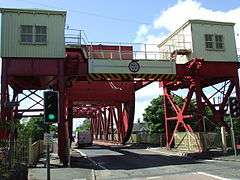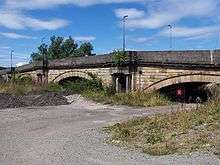White Cart Bridge
| White Cart Bridge | |
|---|---|
 | |
| Coordinates | 55°52′48″N 4°24′33″W / 55.8800°N 4.4091°WCoordinates: 55°52′48″N 4°24′33″W / 55.8800°N 4.4091°W |
| Carries | Motor vehicles, cycles, pedestrians |
| Crosses | White Cart Water |
| Locale | Renfrew |
| Owner | Renfrewshire Council |
| Heritage status | Category A listed |
| Characteristics | |
| Design | Bascule bridge |
| Number of spans | 1 |
| History | |
| Designer | Sir William Arrol |
| Constructed by | Sir William Arrol & Co |
| Opened | 1923 |
| Replaces | Old White Cart Bridge |
White Cart Bridge is situated on the A8 road in Renfrew, Scotland. It is a Scherzer Rolling Lift Bascule Bridge. The bridge crosses White Cart Water at the confluence with the Black Cart River. It is the only remaining lift bridge in the country and became category A listed on 13 December 1994.[1][2][3][4] The bridge is still capable of opening, as the Doosan Babcock factory in Renfrew require the capability to move large loads by river.
History
The White and Black Cart rivers have been an important crossing site for many years. Initially people forded the rivers and latterly a ferry was used to make the crossing. A bridge was built in 1759. It was a seven-arch bridge, crossing both rivers, and was washed away in 1809. Two separate bridges which are still in use today were built in 1812 as a replacement for the crossing. The new bridges could not accommodate large ships sailing into Paisley.[5][6][7]
A new section of river bypassing the low bridge was completed by 1838, requiring a new bridge to cross the White Cart. Initially a swing bridge was used to make the crossing. It was replaced by the lift bridge in 1923. The name swing bridge has remained locally even though the bridge lifts, rather than swings.[8][9]
The bridge was designed by Scottish civil engineer Sir William Arrol. His company William Arrol & Co built some of the most famous bridges in the United Kingdom including the Forth Bridge and Tower Bridge. They were responsible for the construction of the bridge at Renfrew.[10]
In August 2004, a £1m restoration project in connection with Historic Scotland took place. This involved renewing all the mechanical components and resurfacing the road. The bridge was also painted red and cream and had new lights installed.[11]
Gallery
 Bridge after restoration project
Bridge after restoration project View from river bank
View from river bank Engine house and counterbalance weight
Engine house and counterbalance weight Old White Cart bridge
Old White Cart bridge
References
- ↑ "Historic Scotland Data Website - Listed Buildings: Rolling Lift Bridge Over White Cart Water". Historic Scotland.
- ↑ "Secret Scotland - White Cart Bridge". Secret Scotland.
- ↑ "Site Record for Renfrew, Inchinnan Road, Rolling Lift Bridge Over White Cart Water; Bascule Bridge Details". RCAHMS.
- ↑ "Inchinnan Bascule Bridge Opening, White Cart River, Renfrew". Youtube.
- ↑ "Renfrew, Inchinnan Road, White Cart Bridge". Scotlands Places.
- ↑ "Secret Scotland - White Cart Bridge". Secret Scotland.
- ↑ "Renfrew - Renfrewshire Council". Renfrewshire Council.
- ↑ "Secret Scotland - White Cart Bridge". Secret Scotland.
- ↑ "Site Record for Renfrew, Inchinnan Road, Rolling Lift Bridge Over White Cart Water; Bascule Bridge Details". RCAHMS.
- ↑ "Site Record for Renfrew, Inchinnan Road, Rolling Lift Bridge Over White Cart Water; Bascule Bridge Details". RCAHMS.
- ↑ "Cadogans :: Inchinnan Bridge Restoration". Cadogans.